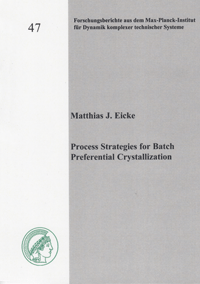
Shop : Details
Shop
Details

December 2016
Matthias J. Eicke
Process Strategies for Batch Preferential Crystallization
An abundance of molecules belongs to the class of chiral compounds. They are called enantiomers and share the same physical and chemical properties. Over the course of evolution, nature eventually favored one of two enantiomers of a molecule to build living organisms. As a consequence, every biological entity is capable to distinguish between enantiomers. This can have fatal consequences especially when chiral molecules are used in pharmaceutical drugs. The most prominent example for such a failure was the thalidomide tragedy, which led to the insight that chiral active pharmaceutical ingredients have to be provided as single enantiomers and not as a 50:50 mixture (racemate). Access is, however, complicated by their identity. It is possible to selectively synthesize one enantiomer by chemical means with significant effort. In many cases the final product has to be in the solid state though requiring additional steps such as crystallization or precipitation.
An alternative strategy is the separation of the racemate. Apart from chromatography, which results in a highly pure but very dilute product stream, crystallization is an attractive process combining separation and solid formation in one step. The enantiomers of a certain class of chiral molecules can be separated by so-called preferential crystallization. This technique allows direct crystallization of single enantiomers from a racemic solution. The focus of this work is a systematic experimental and theoretical investigation of preferential crystallization. The aim is to increase robustness and yield as well as the optimization of process conditions, which involves the study of novel operating modes.
An alternative strategy is the separation of the racemate. Apart from chromatography, which results in a highly pure but very dilute product stream, crystallization is an attractive process combining separation and solid formation in one step. The enantiomers of a certain class of chiral molecules can be separated by so-called preferential crystallization. This technique allows direct crystallization of single enantiomers from a racemic solution. The focus of this work is a systematic experimental and theoretical investigation of preferential crystallization. The aim is to increase robustness and yield as well as the optimization of process conditions, which involves the study of novel operating modes.
Keywords: Enantiomers; Preferential Crystallization; Modeling and Simulation; Chemical Engineering
Forschungsberichte aus dem Max-Planck-Institut für Dynamik komplexer technischer Systeme
Edited by Prof. Dr. Peter Benner, Prof. Dr.-Ing. Udo Reichl, Prof. Dr.-Ing. Andreas Seidel-Morgenstern and Prof. Dr.-Ing. Kai Sundmacher, Magdeburg
Volume 47
Available online documents for this title
DOI 10.2370/9783844048964
You need Adobe Reader, to view these files. Here you will find a little help and information for downloading the PDF files.
Please note that the online documents cannot be printed or edited.
Please also see further information at: Help and Information.
Please also see further information at: Help and Information.
| Document |  | Document | ||
| Type |  | |||
| Costs |  | 36,60 € | ||
| Action |  | Purchase in obligation and download the file | ||
| Document |  | Table of contents | ||
| Type |  | |||
| Costs |  | free | ||
| Action |  | Download the file | ||
User settings for registered online customers (online documents)
You can change your address details here and access documents you have already ordered.
User
Not logged in
Export of bibliographic data
Shaker Verlag GmbH
Am Langen Graben 15a
52353 Düren
Germany
Am Langen Graben 15a
52353 Düren
Germany
Mon. - Thurs. 8:00 a.m. to 4:00 p.m.
Fri. 8:00 a.m. to 3:00 p.m.
Fri. 8:00 a.m. to 3:00 p.m.
Contact us. We will be happy to help you.

